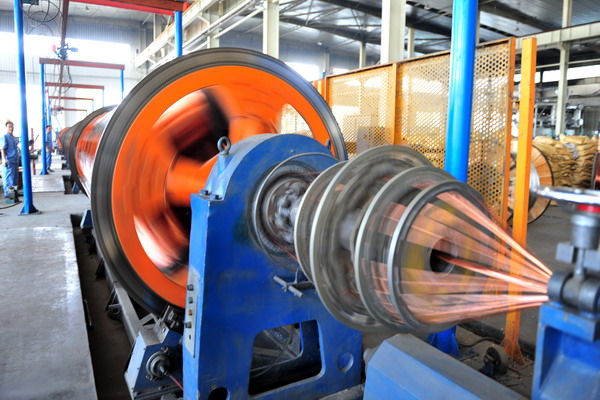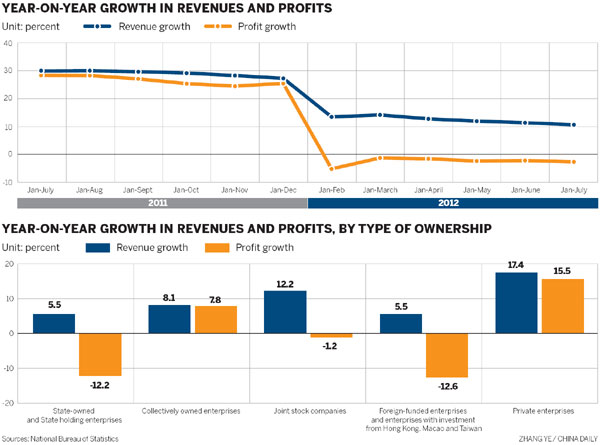
July's 2.7% decline in earnings drives Shanghai index to 41-month low
Chinese industrial companies' profits in July fell by the most this year in a further sign of slowdown in the world's second-largest economy.
Industrial companies' profits in the first seven months of the year declined 2.7 percent to 2.7 trillion yuan ($425 billion), the National Bureau of Statistics said in a statement on Monday.
|
 An electric cable production line in Yichang, in Hubei province. The National Bureau of Statistics said that industrial companies' profits declined 2.7 percent to 2.7 trillion yuan ($425 billion) in the first seven months of the year. [Photo/ China Daily] |
That compares with a 2.2 percent drop in the first half of the year and a 28.3 percent gain in the same period in 2011.
In July, the profits of companies in 41 sectors were 366.8 billion yuan, down 5.4 percent year-on-year, the fourth consecutive monthly fall, according to the bureau. The fall was 1.7 percent in June and 5.3 percent in May.
The latest data add pressure on the government to step up policy easing to reverse a slowdown that may extend into a seventh quarter.
During an inspection tour of Guangdong province last week, Premier Wen Jiabao said difficulties in stabilizing the expansion are "still relatively large" and called for measures to promote export growth to help meet the country's annual economic targets.
The country's benchmark stock index tumbled the most in six weeks by the close on Monday, after the bureau published the figures, showing investors' concern about the gloomy economic outlook.
The Shanghai Composite Index sank 1.7 percent to 2055.71 at the close, a 41-month low.
It retreated 1.1 percent last week and has fallen 6.3 percent this year, as the government kept strict controls on the property market, and the expansion of the manufacturing industry nearly stagnated.
Among the 41 sectors, 15 saw profits decline from a year earlier while 25 increased their net income in July.
State-owned companies made 784.7 billion yuan in net income during the first seven months, 12.2 percent less than that a year earlier, said the bureau. The private sector achieved 818.7 billion yuan in profits, up by 15.5 percent year-on-year.
Tough time
"This year is difficult because both cyclical and structural factors are weighing on the economy and growth recovery," said a research note from Barclay's Capital, which lowered its growth rate prediction from 8.1 percent to 7.9 percent.
The majority of medium-sized enterprises in Wenzhou, Zhejiang province, have been forced to reduce their production and the number of employees.
|
 |
"We've shut down one of three production lines and sent one-third of our workers home, which was caused by a decline in orders by 40 percent, compared to last year," said Zhang Ming, manager of Wenzhou Sincere Shoes, a medium-sized footwear manufacturer mainly exporting women's shoes to Europe and Africa.
Zhang added that heavy taxation added to the burden on his company, which is expected to receive only 10 percent of the net profit it made last year.
Premier Wen acknowledged during his visit to Guangdong that exporters may still face difficulties in the future.
He pledged to boost exports through policies including improving brand strategy, developing intellectual property and expediting the export tax rebate.
"The policies mentioned by Premier Wen will likely help exports in the long term, but may not be effective in turning around exports in the short term," said Zhang Zhiwei, Chinese chief economist with Nomura Securities Co Ltd.
A report in the Financial News — a newspaper supervised by the central bank, said that the slower issuing of new loans may become a normal trend in the future, due to banks' more cautious attitude toward lending and the fast growth of bond financing for small and medium-sized companies.
An anonymous source predicted in the report that the amount of new loans in August may reach 600 billion yuan, higher than the 10-month low of 540.1 billion yuan in July, but lower than June's 919.8 billion yuan.
HSBC China's preliminary Manufacturing Purchasing Managers Index for August last week disappointed the market with a reading at a 9-month low of 47.8, compared with 49.3 in July.
This was due to slowing external demand and insufficient policy support, which are the two major risks for the world's second-largest economy currently and could further delay the growth recovery in the third quarter, said the Barclay's report.
Li Daokui, a former central bank adviser, said last week that weak investment from the corporate sector has held back growth, and the government should do more to boost it.
Contact the writers at [email protected] and [email protected]


 Washington to remain focused on Asia-Pacific
Washington to remain focused on Asia-Pacific RQFII target blue chips amid bear market
RQFII target blue chips amid bear market Australian recall for top two exporters
Australian recall for top two exporters China fears new car restrictions
China fears new car restrictions